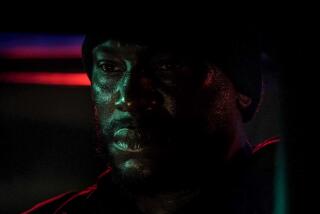Review: Denys Arcand’s heist satire ‘The Fall of the American Empire’ goes south
Pop quiz, hotshot: Your girlfriend has just broken up with you for being existentially frozen and now an armed robber is dead at your feet with a bag of stolen cash. What do you do? That choice is what forever alters the life of pseudo-intellectual egghead Pierre-Paul (Alexandre Landry) and kicks off Denys Arcand’s “The Fall of the American Empire.”
One of Canada’s most acclaimed filmmakers, the Academy Award-winning Arcand (“The Barbarian Invasions”) returns with his 13th feature film, a spiritual/thematic sequel of sorts to “Invasions” and his 1986 film “The Decline of the American Empire.” Arcand has a lot to say about the ethics (or lack thereof) when it comes to the influence of money, but in “The Fall of the American Empire,” it’s a chore to explore these questions with the hapless, high-minded Pierre-Paul, who talks down great writers and artists, and claims to be a genius but doesn’t do much to convince us he actually is.
For the purposes of this experiment, Pierre-Paul picks up the cash and, for a while, embarks on the life he thinks he deserves, hiring a beautiful high-end escort, Camille (Maripier Morin), who goes by Aspasie, the moniker of “the first great whore” and pal of Socrates. All Pierre-Paul wants is to have long talks with her about life and philosophy, and he pursues this fantastical relationship, blissfully unaware of the torture and destruction occurring in pursuit of the missing money. About halfway through the film, that spell is rudely broken, by the cops on his tail and a biker, Sylvain (Rémy Girard), who tries to talk some sense into him.
Arcand’s film worries about themes of money, identity and the inherent danger of quick fixes. Work doesn’t pay and crime does, but it’s a bloody, dangerous affair. These questions of immediate survival are diametrically opposed to the neuroses about sex, love and life’s purpose with which this film is also concerned. The ethically obsessed Pierre-Paul claims to have good intentions (he is rather concerned about the homeless problem in Montréal ), but one can’t help but wonder if it’s about shining his own halo. The worst combination of pretentious and jealous, it’s almost impossible to sympathize with him. But for some reason, Sylvain and Camille want to help him, and so they enlist their Rolodexes of clients and resources to help Pierre-Paul hide his money the rich people way (offshore, of course).
This increasingly convoluted tale moves quickly but goes nowhere. Pierre-Paul embarks on this Sisyphean, labyrinthine journey into the heart of big financial darkness, and he ends up more like Gollum than any other literary figure. The plot gets bigger and bigger, sucking in more and more people as the police close in, but the major theme that emerges is the absurdity of governments trying to stop financial crimes — it’s impossible.
Landry plays the boneheaded Pierre-Paul with as much grace as he can muster, but it’s Morin who steals the show. Discovered on the Quebecois reality show “Occupation Double” (which sounds similar to “Love Island”), she’s primarily worked as a TV host, and this is her first major film role. But she’s an incredibly captivating screen presence within this dull heist comedy. Who could have guessed that “The Fall of the American Empire” would be so much talk and so little action?
Ultimately, we’re not supposed to like anyone and Arcand wants to argue that American-style greed will be the downfall of Canadian values, but the film still ends on a bourgeois fantasy of privatized wealth — and what is that worth?
--------------
‘The Fall of the American Empire’
In French with English Subtitles
Rated: R, for some strong violence, sexual content/nudity and language
Running time: 2 hours, 7 minutes
Playing: Starts Friday, Laemmle Royal, West L.A.
------------
More to Read
Only good movies
Get the Indie Focus newsletter, Mark Olsen's weekly guide to the world of cinema.
You may occasionally receive promotional content from the Los Angeles Times.










